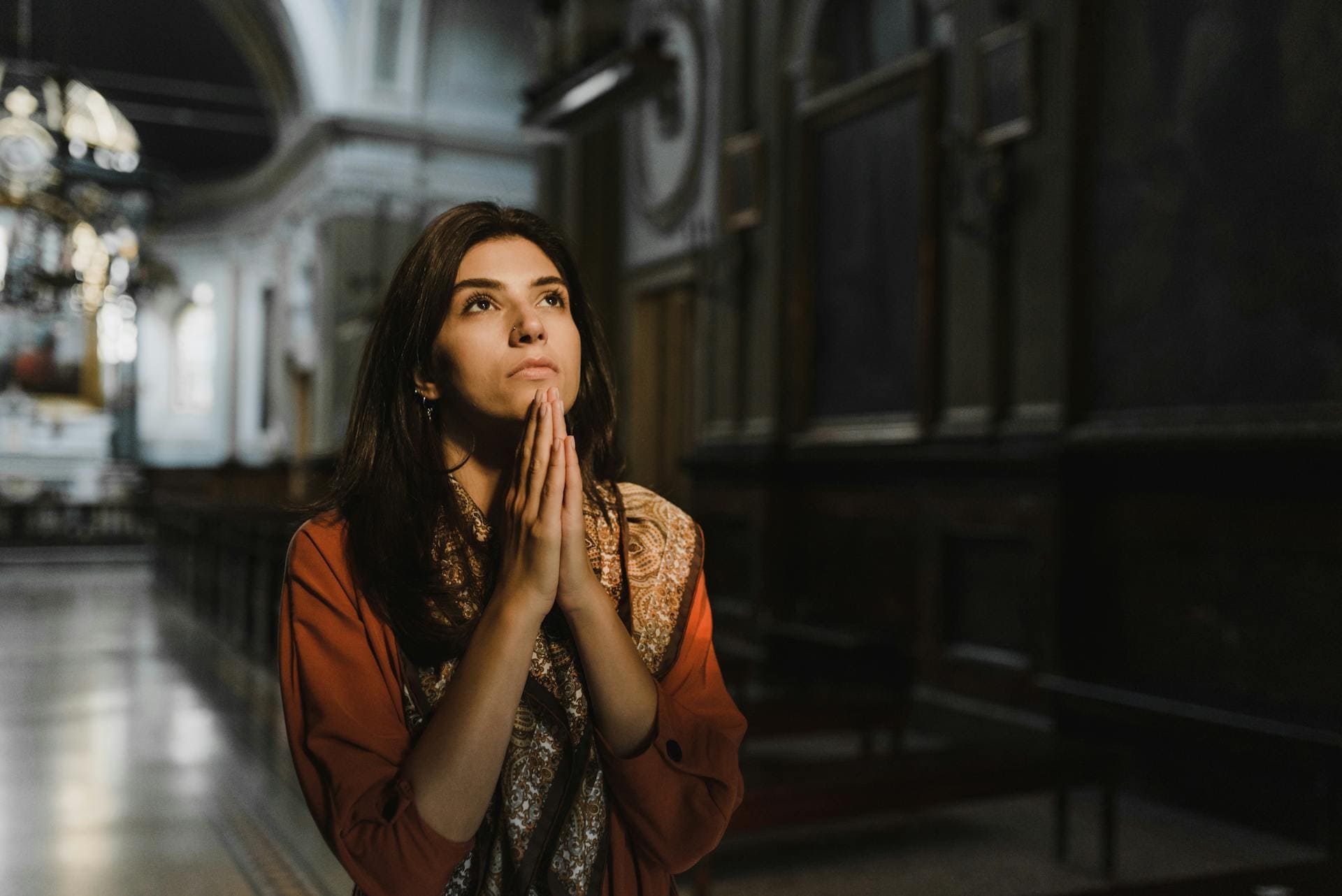Advent is a significant season in the Catholic Church, and it is a time of preparation for the birth of Jesus Christ.
During this season, Catholics engage in various spiritual practices, including prayer, fasting, and almsgiving, to help them focus on the true meaning of Christmas.
One of the most important aspects of Advent is prayer, and there are many Catholic prayers that can help individuals deepen their faith and prepare their hearts for the coming of Christ.
This article provides a comprehensive guide to Catholic prayers for Advent. It includes a full list of prayers, including traditional prayers, novenas, and meditations, that individuals can use to enhance their spiritual practice during this season.
The guide also provides a brief explanation of the significance of Advent and the role of prayer in this season.
Whether you are a seasoned Catholic or new to the faith, this guide will help you deepen your relationship with God and prepare your heart for the coming of Christ.
- Catholic Prayers for Advent
- The Advent Wreath Prayer
- First Week of Advent
- Second Week of Advent
- Third Week of Advent
- Fourth Week of Advent
- The Saint Andrew Christmas Novena
- The O Antiphons
- O Wisdom
- O Lord
- O Root of Jesse
- O Key of David
- O Radiant Dawn
- O King of All Nations
- O Emmanuel
- The Angelus
- The Magnificat
- Understanding Advent
- The Importance of Prayer During Advent
- Conclusion
Catholic Prayers for Advent
Advent is a season of preparation for the birth of Jesus Christ, celebrated by Catholics around the world. It is a time of reflection, prayer, and anticipation.
During this season, Catholics often engage in special prayers and devotions to help them prepare for the coming of Christ.
There are many different Catholic prayers for Advent, each with its own focus and purpose. Some of the most common prayers include the Advent Wreath Prayer, the St. Andrew Christmas Novena, and the O Antiphons of Advent.
The Advent Wreath Prayer is a traditional prayer that is said while lighting the candles of the Advent wreath. It is a simple prayer that helps Catholics to focus on the themes of hope, peace, joy, and love that are associated with each of the four candles.
The St. Andrew Christmas Novena is a powerful prayer that is said for nine consecutive days leading up to Christmas Eve. It is a prayer of preparation and anticipation, asking God to help us to be ready to receive the gift of Christ at Christmas.
The O Antiphons of Advent are a series of seven prayers that are said during the week leading up to Christmas.
Each prayer focuses on a different title for Christ, such as “Wisdom” or “Emmanuel,” and helps Catholics to reflect on the many different aspects of Christ’s nature and mission.
In addition to these traditional prayers, there are many other Catholic prayers for Advent that can be used to help prepare for the coming of Christ.
These include prayers for peace, prayers for forgiveness, and prayers for strength and guidance.
Overall, Catholic prayers for Advent are an important part of the preparation for Christmas.
They help Catholics to focus on the true meaning of the season and to prepare their hearts and minds for the coming of Christ.
The Advent Wreath Prayer
The Advent Wreath is a beautiful tradition that has been a part of Christian celebrations for centuries.
It is a wreath made of evergreen branches, with four candles placed around the circumference and a fifth candle in the center.
Each candle represents one of the four weeks of Advent and is lit on each Sunday during Advent. The fifth candle, known as the Christ candle, is lit on Christmas Eve.
The Advent Wreath Prayer is an essential part of the Advent season. It is a prayer that is said each week as the candles are lit.
The following are the Advent wreath prayers that change every week:
First Week of Advent
The first candle is lit, and the prayer for the first week is said.
Priest: Let us pray. Stir up Thy might, we beg Thee, O Lord, and come, so that we may escape through Thy protection and be saved by Thy help from the dangers that threaten us because of our sins. Who livest and reignest forever and ever. Amen.
Second Week of Advent
The second candle is lit, and the prayer for the second week is said.
Priest: Let us pray. O Lord, stir up our hearts that we may prepare for Thy only-begotten Son, that through His coming we may be made worthy to serve Thee with pure minds. Who livest and reignest forever and ever. Amen.
Third Week of Advent
The third candle is lit, and the prayer for the third week is said.
Priest: Let us pray. We beseech Thee, O Lord, incline Thy ear to our prayers and enlighten the darkness of our minds by the grace of Thy visitation. Who livest and reignest forever and ever. Amen.
Fourth Week of Advent
The fourth candle is lit, and the prayer for the fourth week is said.
Priest: Let us pray. O Lord, we beseech Thee, stir up Thy power and come; and with great might help us, that with the help of Thy grace, Thy merciful forgiveness may hasten what our sins impede. Who livest and reignest forever and ever. Amen.
The Advent Wreath Prayer is a beautiful way to prepare our hearts and minds for the coming of Christ. It is a reminder of the hope, peace, joy, and love that Christ brings into our lives.
By saying this prayer each week, we can deepen our relationship with God and grow in our faith.
The Saint Andrew Christmas Novena
The Saint Andrew Christmas Novena is a traditional Catholic prayer that is often called the “Christmas Novena” or the “Christmas Anticipation Prayer.”
It is a devotion that is prayed 15 times every day from the Feast of Saint Andrew the Apostle (November 30) until Christmas.
The novena is an ideal Advent devotion, and the First Sunday of Advent is the Sunday closest to the Feast of Saint Andrew.
The prayer is named after Saint Andrew, one of the twelve apostles of Jesus and the brother of Saint Peter.
According to tradition, Saint Andrew was the first to follow Jesus and was also the one who brought his brother Peter to Jesus. Saint Andrew is the patron saint of Scotland, Russia, and Romania, and his feast day is celebrated on November 30.
The Saint Andrew Christmas Novena is a powerful prayer that helps prepare the heart for the coming of Jesus at Christmas. It is a prayer of hope, faith, and love that reminds us of the true meaning of Christmas.
The novena is traditionally recited fifteen times a day, and it is a very meditative prayer that helps us increase our awareness of the real focus of Christmas and helps us prepare ourselves spiritually.
Here is the prayer of the Saint Andrew Christmas Novena:
Hail and blessed be the hour and moment in which the Son of God was born of the most pure Virgin Mary, at midnight, in Bethlehem, in the piercing cold. In that hour vouchsafe, I beseech Thee, O my God, to hear my prayer and grant my desires through the merits of Our Savior Jesus Christ, and of His blessed Mother. Amen.
The Saint Andrew Christmas Novena is a beautiful and powerful prayer that can bring us closer to God during the Advent season.
The O Antiphons
The O Antiphons are a set of seven antiphons that are traditionally sung or recited during the week leading up to Christmas Eve. Each antiphon begins with the exclamation “O” followed by a different title for Jesus Christ. These titles are based on the prophecies of Isaiah and express the different ways in which Jesus is understood and celebrated in the Christian tradition.
O Wisdom
The first of the O Antiphons is “O Wisdom,” which highlights Jesus’ divine wisdom and understanding. This title is based on Isaiah 11:2-3, which prophesies that the Messiah will be endowed with the Spirit of wisdom and understanding. By calling on Jesus as “O Wisdom,” Christians express their faith in his divine knowledge and guidance.
O Lord
The second O Antiphon is “O Lord,” which emphasizes Jesus’ sovereignty and power. This title is based on Isaiah 9:6, which prophesies that the Messiah will be a mighty ruler and king. By calling on Jesus as “O Lord,” Christians acknowledge his authority and submit themselves to his will.
O Root of Jesse
The third O Antiphon is “O Root of Jesse,” which celebrates Jesus’ lineage and ancestry. This title is based on Isaiah 11:1, which prophesies that the Messiah will be a descendant of Jesse, the father of King David. By calling on Jesus as “O Root of Jesse,” Christians affirm their belief in his divine ancestry and connection to the royal line of David.
O Key of David
The fourth O Antiphon is “O Key of David,” which emphasizes Jesus’ role as the one who unlocks the gates of heaven. This title is based on Isaiah 22:22, which describes a figure who holds the key to the house of David. By calling on Jesus as “O Key of David,” Christians express their faith in his power to open the way to eternal life.
O Radiant Dawn
The fifth O Antiphon is “O Radiant Dawn,” which celebrates Jesus’ role as the light of the world. This title is based on Isaiah 9:2, which prophesies that the Messiah will bring light and joy to a people living in darkness. By calling on Jesus as “O Radiant Dawn,” Christians proclaim their hope in his power to dispel the darkness of sin and death.
O King of All Nations
The sixth O Antiphon is “O King of All Nations,” which highlights Jesus’ universal sovereignty and lordship. This title is based on Isaiah 9:7, which prophesies that the Messiah will be a king whose dominion extends to all nations. By calling on Jesus as “O King of All Nations,” Christians affirm their belief in his power to unite all people under his rule.
O Emmanuel
The seventh and final O Antiphon is “O Emmanuel,” which means “God with us.” This title emphasizes Jesus’ role as the one who comes to dwell among his people. This title is based on Isaiah 7:14, which prophesies that a virgin will conceive and bear a son who will be called Emmanuel. By calling on Jesus as “O Emmanuel,” Christians express their faith in his presence among them and his power to save them from sin and death.
The Angelus
One of the most popular Catholic prayers for Advent is the Angelus. This prayer is traditionally said three times a day, at morning, noon, and evening, and is a devotion in honor of the Incarnation.
The prayer consists of three Hail Marys, to which are added three introductory versicles and a concluding versicle and prayer.
The Angelus has its origins in the Middle Ages, when illiterate laity found it to be a great way to imitate the monks and nuns who were praying the Liturgy of the Hours throughout the day.
The prayer’s name comes from the Latin word for “angel,” and it commemorates the Annunciation, when the Angel Gabriel appeared to Mary and announced that she would be the mother of Jesus.
The Angelus is a simple yet powerful prayer that can be said alone or with a group. It is a great way to pause and reflect on the mystery of the Incarnation, and to ask for Mary’s intercession.
Many churches ring bells at the traditional times of the Angelus to remind the faithful to pray.
Here is the text of the Angelus prayer:
V. The Angel of the Lord declared unto Mary,
R. And she conceived of the Holy Spirit.
Hail Mary, etc...
V. Behold the handmaid of the Lord.
R. Be it done unto me according to Your Word.
Hail Mary, etc...
V. And the Word was made flesh,
R. And dwelt among us.
Hail Mary, etc...
V. Pray for us, O holy Mother of God,
R. That we may be made worthy of the promises of Christ.
Let us pray:
Pour forth, we beseech Thee, O Lord, Thy grace into our hearts, that we to whom the Incarnation of Christ, Thy Son, was made known by the message of an Angel, may by His Passion and Cross be brought to the glory of His Resurrection. Through the same Christ our Lord. Amen.
The Magnificat
The Magnificat is a hymn of praise and thanksgiving that Mary, the mother of Jesus, sang to Elizabeth during her visitation. It is a powerful and beautiful prayer that is often recited during Advent.
The Magnificat is a bold prayer that speaks of God’s mercy and love for the poor and lowly. It is a reminder that God is always with us, even in our darkest moments, and that we can find hope and strength in him.
Many Catholics recite the Magnificat as part of their daily prayers during Advent. It is a wonderful way to prepare for the coming of Christ and to reflect on the true meaning of Christmas.
There are many different versions of the Magnificat, including traditional Latin and English translations, as well as modern interpretations. Some versions include additional verses or prayers that can be recited alongside the Magnificat.
Overall, the Magnificat is a beautiful and powerful prayer that can help Catholics deepen their faith and prepare their hearts for the coming of Christ during Advent.
Understanding Advent
Advent is a significant period of the Catholic liturgical year that begins four Sundays before Christmas and ends on December 24th.
It is a time of preparation and waiting for the coming of Jesus’ birth. The word “Advent” is derived from the Latin word “adventus,” which means “coming.”
During this season, Catholics are called to reflect on the coming of Christ, not only as a baby in Bethlehem but also as the Savior of the world.
The Advent season is marked by various customs and traditions, such as the Advent wreath, which is a circular wreath made of evergreen branches with four candles representing the four weeks of Advent.
Three of the candles are purple, and one is rose, symbolizing hope, peace, joy, and love. The lighting of the candles is accompanied by prayers and reflections.
Another tradition during Advent is the Jesse Tree, which is a tree decorated with symbols that represent the genealogy of Jesus Christ.
Each day, a new symbol is added to the tree, leading up to the birth of Jesus. The Jesse Tree is a visual representation of the anticipation and preparation for the coming of Christ.
During Advent, Catholics are also encouraged to participate in acts of charity and kindness, in line with the spirit of the season.
This can include volunteering at a local soup kitchen, donating to a charity, or simply performing small acts of kindness for others.
Overall, Advent is a time of reflection, preparation, and anticipation for the coming of Christ.
Through prayer, reflection, and acts of kindness, Catholics can deepen their faith and prepare their hearts to receive the gift of Jesus Christ.
The Importance of Prayer During Advent
Advent is a time of preparation and waiting for the coming of Jesus Christ. It is a season of hope, joy, and peace.
Prayer is an essential part of this preparation. It helps us to focus on the true meaning of Christmas and to deepen our relationship with God.
During Advent, Catholics are encouraged to pray more often and more fervently. This is because prayer is a powerful tool that can help us to grow in faith and to draw closer to God.
It can also help us to prepare ourselves spiritually for the coming of Jesus Christ.
There are many different types of prayers that Catholics can use during Advent. Some of the most common include the Advent wreath prayers, the O Antiphons, and the Novena to the Immaculate Conception.
These prayers can be said alone or with others, and they can be adapted to suit individual needs and preferences.
Prayer during Advent can also help us to stay focused on the true meaning of Christmas. It can be easy to get caught up in the commercialism and busyness of the season, but prayer can help us to remember that Christmas is about the birth of Jesus Christ, the Son of God.
It can help us to keep our hearts and minds centered on the love and grace of God.
In summary, prayer is an essential part of Advent preparation for Catholics. It helps us to deepen our faith and relationship with God, and to stay focused on the true meaning of Christmas.
There are many different types of prayers that can be used during Advent, and Catholics are encouraged to pray more often and more fervently during this season.
Conclusion
Advent is a time of expectant waiting and preparation for the celebration of Jesus’ birth at Christmas.
It is a time to reflect on the true meaning of Christmas and to deepen one’s faith through prayer, meditation, and acts of kindness.
Through the Catholic prayers for Advent, believers can connect with God and seek His guidance and blessings.
The prayers offer hope, peace, and joy during the busy holiday season, reminding us of the true reason for the season.
Whether one chooses to recite the traditional prayers or the more modern ones, the act of prayer during Advent can be a powerful way to connect with God and experience His love and grace.
By taking time each day to pray and reflect during Advent, believers can deepen their faith and grow closer to God. It is a time to slow down, take a breath, and focus on the true meaning of Christmas.
As the Advent season comes to a close and Christmas approaches, let us remember to carry the spirit of Advent with us throughout the year, seeking to live out our faith and share God’s love with others.







